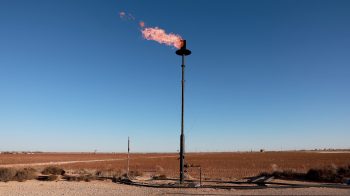Study supports exporting U.S. natural gas
A new report conducted for the Obama administration’s Energy Department arrives at a not-surprising conclusion: If you have a low-cost item, mark it up and sell lots abroad — whether it’s cotton, almonds or natural gas — it’s a net gain to the economy.
The company Cheniere Energy has been making the argument for years. It operates natural gas export terminals. CEO Charif Souki says the U.S. has a glut of natural gas, on the order of several billion cubic feet, or BCF.
“We don’t know what to do with this gas,” Souki says. “So what are we going to do with it? Not sell it. That’s great. Every BCF is 50,000 jobs. Every bcf is $3 or $4 billion a year.”
The Energy Department will use the report as it decides whether to allow new exports of natural gas.
But opponents have their math, too. The U.S. petrochemical industry buys cheap gas as a raw material. And for now, it’s outcompeting much of the world.
Export too much, and prices could go up, the industry argues.
“The longer we can stay with affordable, predictable prices that are good for producers and consumers, the better off our country will be,” says Seth Roberts of Dow Chemical.
Also against exports: protectionists, critics of the natural-gas drilling process known as fracking, and those who argue exports undermine energy security.
In the end, the market put on the brakes. It’s unclear how long U.S. prices will stay low vis-à-vis the rest of the world, or how much long-term global demand is really out there.
“I think there is going to be a limit to how many potential exporters can really line up the financing that they need to deliver,” says Michael Levi of the Council on Foreign Relations.
Either way, the country now has a political fight over exporting energy — one it hasn’t had for 50 years. And natural gas may be the warm-up act: U.S. production of certain types of crude oil is poised to outrun domestic refining capacity. The oil export debate could arrive as early as next spring.
There’s a lot happening in the world. Through it all, Marketplace is here for you.
You rely on Marketplace to break down the world’s events and tell you how it affects you in a fact-based, approachable way. We rely on your financial support to keep making that possible.
Your donation today powers the independent journalism that you rely on. For just $5/month, you can help sustain Marketplace so we can keep reporting on the things that matter to you.


















